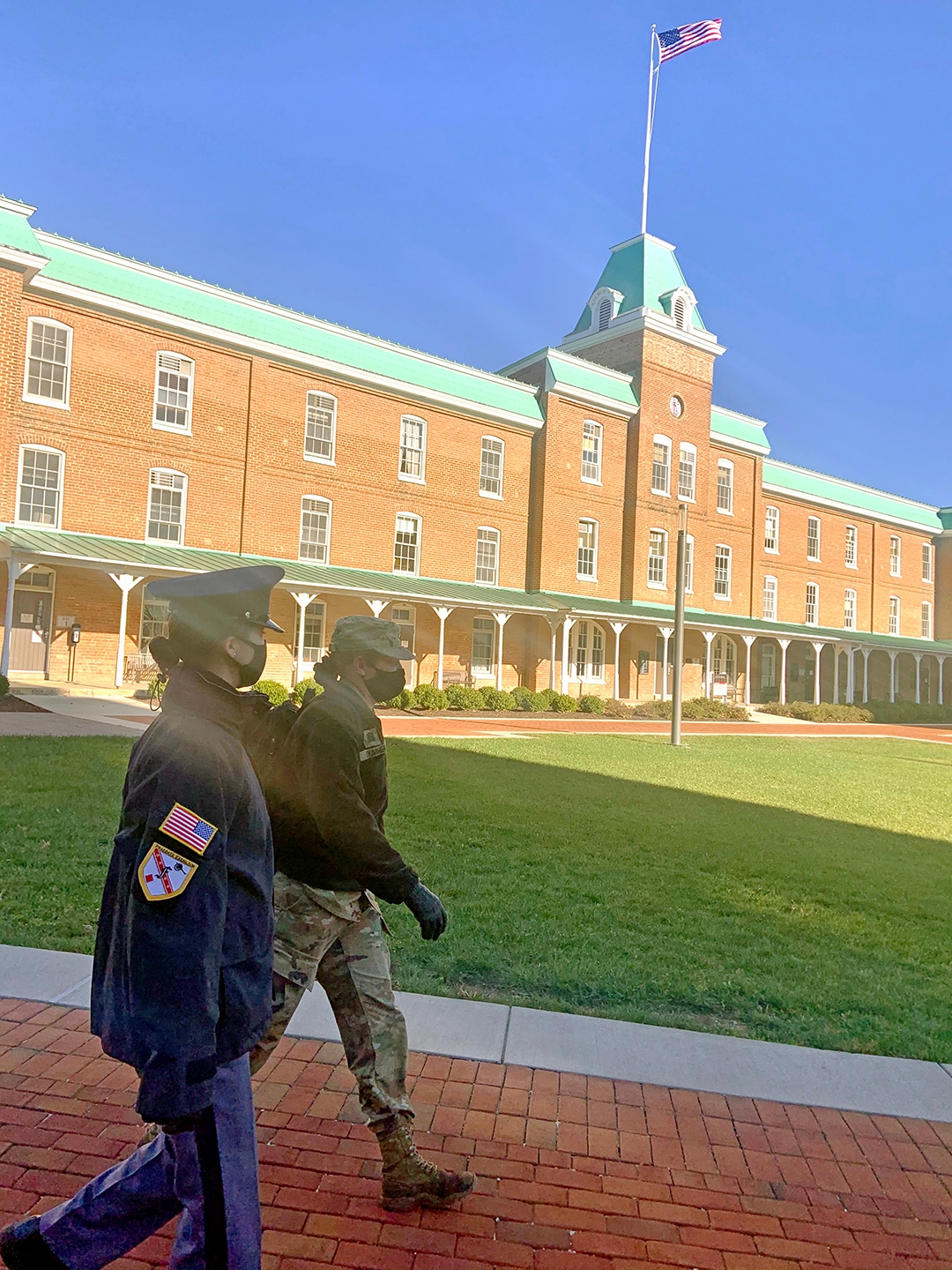Challenge Accepted
By Regimental Public Affairs Officer Megan Watkins ’21
Student life across Virginia Tech’s campus has become a virtual reality that defines our new normal. We, as cadets and students, have found new heights of strength and community, the kind often overlooked if we confuse unforeseen change as difficulty.
The Corps of Cadets came together for the fall semester without the normality of face-to-face interaction and fostered an atmosphere driven by a united pursuit to push through hardship. Although COVID-19 precautions diminished the in-person education we were all comfortable with, we are learning to adapt and continue moving toward our future.

Taking on this unique time of global pandemic has been an experience we, as cadets, will all certainly never forget.
Regimental Commander and Air Force cadet Mame Ngom ’21 said all cadets had to rise to the challenge of having to change the way things have traditionally been done to incorporate safety measures, such as wearing masks, physical distancing, and increased hygiene standards.
“Returning to campus during a global pandemic has definitely posed a variety of challenges. Within the Corps of Cadets, a lot of leadership has had to navigate new and fast-changing protocols and policies,” she said. “Coming back to a college campus and trying to ensure everyone’s safety as well as our own was a multi-faceted issue.”
Within the Corps and the ROTC programs, active training and events needed to go on, despite the fact that “dealing with a pandemic has made facilitating these things a hundred times harder,” Ngom said.
However, once everyone got into a battle rhythm, became comfortable with COVID-19 testing, and understood how to better keep each other safe, moving forward progressively became easier.
“Virginia Tech is beginning to feel like home again. Returning next semester and knowing how long we have stayed on campus already will definitely make the next adjustment period a lot easier,” she said.

After I graduated with a bachelor’s degree in agricultural engineering and was commissioned as a second lieutenant in the U.S. Army, I deferred a year and earned a master’s degree in agricultural engineering.
My only duty station was at Tooele Army Depot in Utah. I left the service after three years, worked for Norfolk Southern as a mechanical engineer for two years, and then worked 35 years as a safety engineer and consultant for several firms. I was also able to remain on the family farm in Virginia, my real love, throughout my entire career.
Having retired from the corporate world in 2011, I live and work on the farm with my wife, who is a gifted writer. We have reared two sons — one in grad school at Virginia Tech and the other a graduate of Liberty University. We care for one old dog, one spoiled Maltese dog (or, as my wife would say, “princess” not dog), one old cat, one kitten, 80 momma cows, 50 or so calves, and three money-making bulls.
I worked at one company for 25 years and became friends with one guy in particular. We traveled quite a bit together. One day, as we were off to visit a client, I noticed he had a shovel in his back seat. This was sometime in early spring.
I asked him why he had the shovel, and he said he had to bury his dad!
“What?” I asked. His dad had died some months before.
“Um, where is your dad?” I asked.
He replied, “In the trunk.”
I nearly fell out of the car.
He explained that his dad was cremated and his ashes had been riding in the trunk until the ground was thawed enough to be buried. This is the same guy who broke up with a girl in high school, and as I recall, put a dead pig’s head on top of the snowman in her front yard! It made the paper. Life is only as boring or exciting as we make it, and great friends are a must along the way.

Second Battalion Sergeant Major and Air Force cadet Margaret McConville ’22 said that life in the Corps and the ROTCs “has drastically changed” because of the pandemic.
“Using the previous models for the training plans we have used every year has proved to be inadequate for planning purposes,” she said. “Therefore, leadership must lay the foundations for operations, keeping [COVID-19] mitigation procedures in mind the entire time. This way, plans are already infused with safety techniques, and a new precedent for training can be set.”

Kilo Battery Commander and Army cadet Zach Young ’21 said the pandemic offers new leadership lessons for cadets. “As a leader during this crisis, I personally have learned so much about leading in uncertainty, flexing with ever-changing guidance, and supporting the greater cause by initiative-driven involvement.”
A positive change he has seen is new autonomy at the company level. To support physical distancing, companies have moved to small-group training. This has increased productivity and provided a more realistic experience, as a cadet learn to operate as a future military officer, Young said.
The most important change Young has seen is the level of discipline cadets are required to keep. Not only do we have to perform all normal military functions, but we do them now at a distance while wearing a mask.
It has also been a challenge for morale, forcing companies to think creatively to host safe gatherings. Events have become more manageable by new ways to handle food or having multiple small-group gatherings. Cadets have tried to make fall as normal as possible.
This semester has created an even more unique experience to learn leadership in.
As the regimental public affairs officer, Megan Watkins ’21 manages the Corps’ Instagram account (@vtcorpsofcadets), coordinates the cadet photographers, and supports publicity efforts. She is in the Corps’ Citizen-Leader Track and majoring in marketing.


